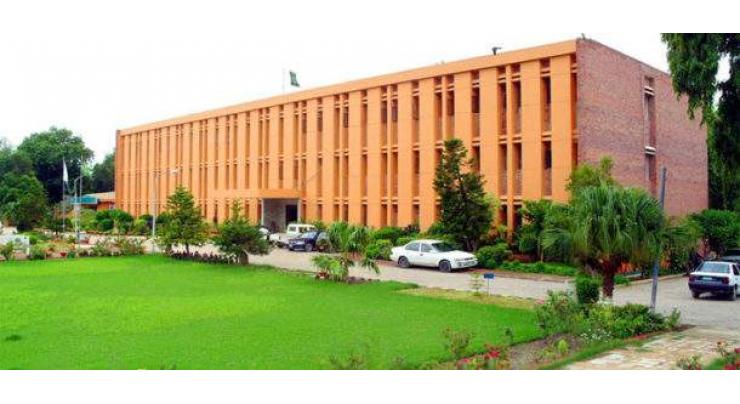
Sindh Agriculture University Organizes Webinar On Floods
Umer Jamshaid Published September 01, 2022 | 09:29 PM

Sindh Agriculture University (SAU) Tando Jam in collaboration with Centre for Business and Economic Research (CBER) and Institute of Business Administration (IBA) Karachi Thursday organized a special webinar on "Floods 2022: Situation, Response, Blind Spots, and Way Forward".
HYDERABAD, (UrduPoint / Pakistan Point News - 1st Sep, 2022 ) :Sindh Agriculture University (SAU) Tando Jam in collaboration with Centre for business and Economic Research (CBER) and Institute of Business Administration (IBA) Karachi Thursday organized a special webinar on "Floods 2022: Situation, Response, Blind Spots, and Way Forward".
Addressing the webinar, Chairman Higher education Commission Dr. Mukhtar Ahmed said that the commission had created a sizable research fund to support evidence-based and solution-oriented research to address current and future natural disasters.
He said that the country's universities, researchers and experts had great responsibilities to open new doors to problem-oriented research, adding special decisions would be made for the students of all the universities in that regard.
Former Federal Secretary, Planning Commission Fazallilah Qureshi termed the floods as a national catastrophe but of different magnitude in different parts of the country .
Vice Chancellor, Sindh Agriculture University Tando Jam Dr. Fateh Marri briefed about the status of current situation of the disaster and urged to introduce late varieties of different crops and short-duration crops in the country besides launching the farmers' guidance programmers.
He expressed his concern over loss of economic activity, future productions, missed opportunities and the limited capacity of human resources as a result of the current disaster.
Vice Chancellor University of Agriculture Faisalabad DR. Iqbal Ahmed Khan said that drainage was the main issue of Sindh due to its location and it required attention.
He suggested to include feeds of livestock in the relief items of the affected households.
Dr. Mubarik Ahmed from TDAP said that the agriculture losses to the country were huge and among other crops, some 80 percent of the cotton in Sindh and 100 percent of the crop in Balochistan were affected.
He warned that the disaster would result in reducing export and increase dependence on foods and seed imports.
Dr. Abdul Rehman talked about damages to cities and pointed toward increased incidences of domestic violence, child labor, and various forms of harassment that often slip from disaster response initiatives.
Naseer Memon said that the encroachment in the rural and urban areas was the cause of the flood-induced disaster and held weak institutional capacity and lack of political will was responsible for that.
Dr. Shereen Narejo, Former Chairperson of Sindh Planning, and Development Department said that the issue of population growth was often missed in climate discourse and emphasized that the disaster was our collective problem and required collective action.
Related Topics
Recent Stories

Security forces kill four terrorists in Tank

Fake immoral video of Ducky Bhai's wife goes on viral on social media

Currency Rate In Pakistan - Dollar, Euro, Pound, Riyal Rates On 29 April 2024

Today Gold Rate in Pakistan 29 April 2024

Currency Rate In Pakistan - Dollar, Euro, Pound, Riyal Rates On 28 April 2024

Today Gold Rate in Pakistan 28 April 2024

Fresh wave of rainfall in AJK continues for the second consecutive day

Babar, bowlers help Pakistan level series 2-2 against New Zealand

Attack in restive Chilean province leaves three police officers dead

PM, Saudi Royal court advisor discuss ways to boost economic ties

England clinch third successive Women's Six Nations Grand Slam

DC Bahawalnagar leads fight for fair bread prices
More Stories From Pakistan
-
Restoration of damaged roads in Upper KP starts; five killed, six injured: PDMA
13 seconds ago -

Fake immoral video of Ducky Bhai's wife goes on viral on social media
18 minutes ago -
One killed, several injured in accident
50 minutes ago -
Urdu fiction writer A Hameed remembered on death anniversary
1 hour ago -
Abducted session judge Shakirullah Marwat unconditionally released: CTD
1 hour ago -
Nationwide anti-polio drive begins in 91 districts from Monday
1 hour ago
-
PM meets Bill Gates; urges sustained efforts by partners for polio-free Pakistan
1 hour ago -
Capital police to exercise zero tolerance policy against street crimes, drug abuse
1 hour ago -
PM to address closing plenary of WEF special meeting, meet Saudi ministers today
2 hours ago -
16 hotel owners held for Roti price violation
2 hours ago -
Seven POs charged with murder held
2 hours ago -
PM attends Special Dialogue, Gala Dinner hosted by Saudi Crown Prince
12 hours ago
